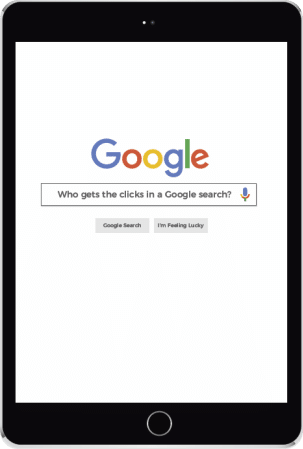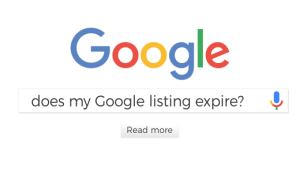
PROOF SEO is Valuable
Download the PDF to see which links on Google get the most clicks.
Don’t Think SEO is Worth it?
Who Gets the Clicks on a Google Search
Ever wonder where that “other sock” goes? Maybe it is hiding on Page 2 of a Google search.
If it is on Page 2 of Google, then it will never be found.
Unfortunealty in this day and age, we suddenly don’t have time anything anymore. When we want something, we want it now. That also goes for the information we want. When we “Google” something, we want the best, correct, most accurate results.
Typically we want it so bad that we want it to always be the very top link in Google. If it isn’t the top link, we barely want to scroll or swipe down the page to see if the right link is just lingering a few spots down the list.
Google is the #1 search engine for a reason …
Their algorithm for searching millions of websites and returning the results we want is amazing. But sometimes lost in this equation is the hard work, knowledge, and dedication the right web developer and right SEO team can do for your website.
Google has a loooong list of things it uses to grade websites. The websites that follow these guidelines will be found faster and rank higher. Most people don’t realize this … and why should they?
If they don’t operate a business with a website or ever relied on a website to attract more leads. Then they just go along thinking it is how it is. They have a website, Google will find it. My potential customers will find it. Sorry, but that is wrong.
Granted … if people search for “Best Buy” … they will find Best Buy.
But what if they search for “the best mortgage rate“. Then Google will return a whole host of websites offering “the best mortgage rate”.
This is where the algorithm comes in. Of all of the sites on the internet Google has to:
- Find all of the sites that are related to “mortgage”, “rates” and claim to have “the best”
- Then based on their secret algorithm, sort all of the sites into a series of 10 organic links.
- Based on your location, based on page speed (loading time), based on a number of factors …
All of this in under 1 second.
Are you “feeling lucky” that your company website will be on the first page? in the top 5? Number 1?


There are 4 types of searches
NAVIGATIONAL. INFORMATIONAL. TRANSACTIONAL. VOICE.I want to KNOW. I want to GO. I want to DO. I want to BUY
There are 3, well 4 types of searches that are performed.
- NAVIGATIONAL SEARCH
- INFORMATIONAL SEARCH
- People searching for “landscape ideas for backyard”. They are just looking for info and ideas, not yet ready to buy
- TRANSACTIONAL SEARCH
- People searching for “where can I buy a Ralph Lauren suit?” They know what they want, they just don’t know where to buy.
- VOICE SEARCH
- With Google Home, Amazon Echo, Apple Home Pod, Google Assistant, Siri, Cortana, and more. People are searching with their voice. When they search using their voice, they will use different keywords and more keywords.
- For example, on their phone, they might type in a search like: “restaurants near me”. Where with a voice search they might search with: “seafood restaurants that have all you can eat shrimp”
Because they don’t have to type, they will use more words and also be more specific.
Not sure if you were aware, but ….
All search engines will return 10 listings per page. That is 10 organic listings. Listings that have not been paid for to Google, Bing or Yahoo.
Those “PAID FOR” listings show up as ADS (advertising) above and below the 10 organic listings. Oh yeah, there might also be a map at the top of the page as well. This is how the search engines make money.
When you see ads on some searches and no ads on other searches. This typically means that the search words you used in your search, that is it very competitive and companies want to be found for that search.
Back to the Organic Results …
With only 10 organic listings per page, you might think it is ok to be one of the 10 listings. A few years ago you might have been right, but not anymore. If you look at the “Who Gets the Clicks” document, you will see that only the top 2, (ok, maybe top 3 or 4) listings are worth it.
The number 1, organic listing receives 36.4% of the clicks, number 2 drops by more than half!
If you think about it … if you are looking for a PLUMBER, and the #1 spot is a Plumber, why would you go any further??
Sometimes you will see in the listings, links to other sites, typically other directories like yellow pages, Kijiji and Used Regina. Now depending on your needs for a plumber, you may not have time to poke around other directories. You are already on a directory, the best directory, Google.
What does this mean for you?
What if your site appears on the first page but low on the page. What if your site shows up on Page 2 of Google, with all those unpaired socks?
Well … there are a number of things you can do. Unfortunately, we don’t want to give away all of our secrets, but here are a few things you can do.
- Request an SEO Audit of your site
- Hire a professional web developer that knows about SEO
- Work with us on a Strategy.
Download the PDF to see which links on Google get the most clicks.


 It is a scam. We probably get about 3 or 4 calls a week from one of these companies. But we do answer them, we press #1 to speak to a representative (it could be why we get so many calls). But we answer them and want to talk to them because we like to challenge them. Most times they hang up. So how reputable can they be?
It is a scam. We probably get about 3 or 4 calls a week from one of these companies. But we do answer them, we press #1 to speak to a representative (it could be why we get so many calls). But we answer them and want to talk to them because we like to challenge them. Most times they hang up. So how reputable can they be?


